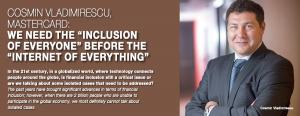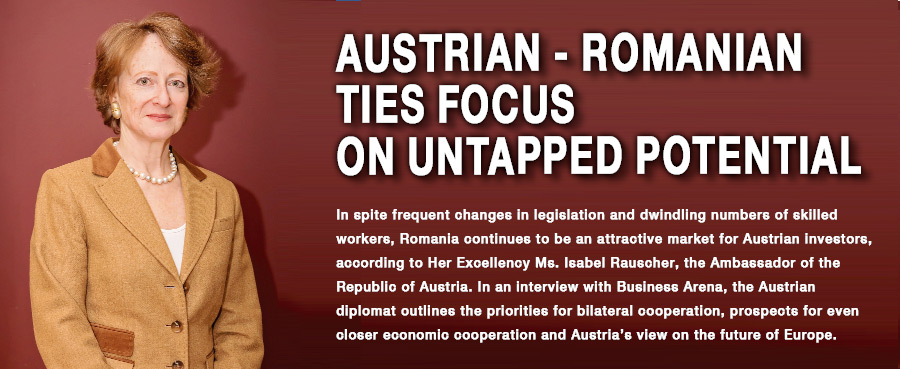Cosmin Vladimirescu, Mastercard: We need the 'Inclusion of Everyone' before the 'Internet of Everythin'
In the 21st century, in a globalized world, where technology connects people around the globe, is financial inclusion still a critical issue or are we talking about some isolated cases that need to be addressed?
The past years have brought significant advances in terms of financial inclusion;
however, when there are 2 billion people who are unable to participate in the global economy, we most definitely cannot talk about
isolated cases.
Financial inclusion is a subject that cannot be addressed without talking about the shortcomings of cash in circulation. Cash is by no means an ally of the financially excluded. It is not a friend of the almost half of Romanians that don’t even have a bank account. Without financial inclusion, we cannot fulfill the promise of a global economy. Thus, I firmly consider it to be of utmost importance to stride towards raising financial inclusion, as it is the foundation for more inclusive, equitable, and sustainable economic growth.
Despite advances made in the last five years across the globe, 85% of the world’s retail transactions are still cash-based, and many people still do not have a bank account. They are trapped in a cash economy, lacking the financial services that help them guard against risk, they cannot invest in their future and have difficulties building better lives for themselves. These people live their lives in financially complex times, whilst being completely separated from banks and other financial services providers.
At Mastercard, our efforts aim to address this issue. In partnership with financial institutions, merchants, telecommunications companies, governments and non-governmental organizations, we provide the technology and the solutions with the capacity to connect these people with the financial system, in the best way possible. Since 2013, we have helped make the financial world more accessible to nearly 200 million people previously financially excluded, through more than 500 Mastercard programmes in more than 50 countries. And this is only the beginning – we are committed to connecting 500 million people by 2020.
Can you tell us more about these financial inclusion programmes Mastercard is involved in?
First of all, I would like to mention that we take great pride in being named in Fortune’s “Change the World” list for the second year in a row, with Mastercard being recognized amongst the leading companies making important social or environmental impact through their corporate strategies. Mastercard was included at a11 in Fortune’s inaugural list last year, for our work to expand financial inclusion, whereas this year, we ranked a7.
Mastercard set a goal to connect 40 million micro and small merchants to its electronic payments network within five years. This expands on the company’s Universal Financial Access 2020 commitment made last year and mentioned above.
We also run multiple programmes allowing underbanked people from around the world to participate in the formal economy through electronic means. One example is the disbursement of social benefits on cards, which is having a major impact on people’s lives all over the world, in developing or emerging markets.
In South Africa, for instance, we’re partnering with the South African Social Security Agency to deliver government funds on debit cards fitted with biometrics functionalities. We’ve opened up a world of financial inclusion to more than 10 million South Africans who previously had no access to traditional financial services, by leveraging electronic payments of social benefits on biometric cards. These also alleviated some of the unwarranted costs with disbursing social benefits on paper checks or in cash – leading to savings of more than 15 million USD annually.
In Nigeria, the government launched a national ID pilot program that combines biometric identification with a prepaid payment capability that is enabled by MasterCard technology for 13 million adult Nigerians. The government is currently issuing and personalizing 16,000 cards for eligible applicants every day, and it represents the broadest financial inclusion initiative of its kind on the African continent.
In India, Mastercard partnered with the Unique Identification Authority of India (UIDAI) to offer biometric authentication services for the Aadhaar program, the largest biometric identity program in the world, and the cornerstone for achieving financial inclusion in India.
The examples can go on, but the silver bullet resides in the massive impact and generalized benefits these electronic payments provide over traditional methods.
These benefits have recently been on display in Romania as well. Throughout the last year, the issuing of electronic meal vouchers began, with the three most important issuing companies opting for Mastercard prepaid cards for
the issuance of meal vouchers on electronic support. The more than 200,000 cards issued insofar, according to aggregated issuers’ data, represent a penetration rate of more than 10% out of the total two million Romanian employees that receive extra-salary benefits in the form of meal vouchers. We are confident that through other similar initiatives, such as disbursing social benefits on cards or the continued expansion of cards acceptance footprint provided by the entering into force of the cash-back law, could have a massive impact in terms of building a bridge towards the underbanked areas in Romania, as well as supporting the 1 in 2 Romanians that still lack basic financial access.
We believe Romania could soon be, and needs to be on the global map of the financially included and Mastercard would be delighted to contribute, given the market’s needs as well as our expertise in providing the optimal solution for raising financial inclusion and extending the benefits of electronic payments to consumers.
The past years have brought significant advances in terms of financial inclusion;
however, when there are 2 billion people who are unable to participate in the global economy, we most definitely cannot talk about
isolated cases.
Financial inclusion is a subject that cannot be addressed without talking about the shortcomings of cash in circulation. Cash is by no means an ally of the financially excluded. It is not a friend of the almost half of Romanians that don’t even have a bank account. Without financial inclusion, we cannot fulfill the promise of a global economy. Thus, I firmly consider it to be of utmost importance to stride towards raising financial inclusion, as it is the foundation for more inclusive, equitable, and sustainable economic growth.
Despite advances made in the last five years across the globe, 85% of the world’s retail transactions are still cash-based, and many people still do not have a bank account. They are trapped in a cash economy, lacking the financial services that help them guard against risk, they cannot invest in their future and have difficulties building better lives for themselves. These people live their lives in financially complex times, whilst being completely separated from banks and other financial services providers.
At Mastercard, our efforts aim to address this issue. In partnership with financial institutions, merchants, telecommunications companies, governments and non-governmental organizations, we provide the technology and the solutions with the capacity to connect these people with the financial system, in the best way possible. Since 2013, we have helped make the financial world more accessible to nearly 200 million people previously financially excluded, through more than 500 Mastercard programmes in more than 50 countries. And this is only the beginning – we are committed to connecting 500 million people by 2020.
Can you tell us more about these financial inclusion programmes Mastercard is involved in?
First of all, I would like to mention that we take great pride in being named in Fortune’s “Change the World” list for the second year in a row, with Mastercard being recognized amongst the leading companies making important social or environmental impact through their corporate strategies. Mastercard was included at a11 in Fortune’s inaugural list last year, for our work to expand financial inclusion, whereas this year, we ranked a7.
Mastercard set a goal to connect 40 million micro and small merchants to its electronic payments network within five years. This expands on the company’s Universal Financial Access 2020 commitment made last year and mentioned above.
We also run multiple programmes allowing underbanked people from around the world to participate in the formal economy through electronic means. One example is the disbursement of social benefits on cards, which is having a major impact on people’s lives all over the world, in developing or emerging markets.
In South Africa, for instance, we’re partnering with the South African Social Security Agency to deliver government funds on debit cards fitted with biometrics functionalities. We’ve opened up a world of financial inclusion to more than 10 million South Africans who previously had no access to traditional financial services, by leveraging electronic payments of social benefits on biometric cards. These also alleviated some of the unwarranted costs with disbursing social benefits on paper checks or in cash – leading to savings of more than 15 million USD annually.
In Nigeria, the government launched a national ID pilot program that combines biometric identification with a prepaid payment capability that is enabled by MasterCard technology for 13 million adult Nigerians. The government is currently issuing and personalizing 16,000 cards for eligible applicants every day, and it represents the broadest financial inclusion initiative of its kind on the African continent.
In India, Mastercard partnered with the Unique Identification Authority of India (UIDAI) to offer biometric authentication services for the Aadhaar program, the largest biometric identity program in the world, and the cornerstone for achieving financial inclusion in India.
The examples can go on, but the silver bullet resides in the massive impact and generalized benefits these electronic payments provide over traditional methods.
These benefits have recently been on display in Romania as well. Throughout the last year, the issuing of electronic meal vouchers began, with the three most important issuing companies opting for Mastercard prepaid cards for
the issuance of meal vouchers on electronic support. The more than 200,000 cards issued insofar, according to aggregated issuers’ data, represent a penetration rate of more than 10% out of the total two million Romanian employees that receive extra-salary benefits in the form of meal vouchers. We are confident that through other similar initiatives, such as disbursing social benefits on cards or the continued expansion of cards acceptance footprint provided by the entering into force of the cash-back law, could have a massive impact in terms of building a bridge towards the underbanked areas in Romania, as well as supporting the 1 in 2 Romanians that still lack basic financial access.
We believe Romania could soon be, and needs to be on the global map of the financially included and Mastercard would be delighted to contribute, given the market’s needs as well as our expertise in providing the optimal solution for raising financial inclusion and extending the benefits of electronic payments to consumers.
The editorial is also available in our print edition.
S-ar putea să îți placă:
COMENTARII:
Fii tu primul care comenteaza







